- Home
- Joel C. Rosenberg
The Twelfth Imam Page 8
The Twelfth Imam Read online
Page 8
He dared not ask his aunt or his uncle about any of this. He couldn’t confide in anyone he knew. They would think he had gone mad. And maybe he had. But maybe not. Maybe Khomeini really hadn’t been the one the Islamic world was waiting for but rather just a forerunner. Perhaps the end of days was truly approaching. Perhaps the messiah was coming after all—and soon.
As the sun began to rise in the eastern sky, a weary Najjar slipped out of bed, quietly opened his bedroom door, scanned the hallway for any signs of movement, and then carefully crept to the living room, hoping he wouldn’t wake anyone. On the shelf beside the television, there were a handful of books—the family Qur’an, of course, and then a series of Shia histories and theological textbooks. His uncle, a devoutly religious man, had wanted to be a mullah before abandoning his studies to join the family business. But even to this day, whenever he had a little spare change, he bought another of the religious books he loved to study, and Najjar loved him for it.
One particular book on the highest shelf was by an Iranian man named Dr. Alireza Birjandi, one of the most renowned Shia scholars in the world and an expert on Shia eschatology, or End Times theology. His book, The Imams of History and the Coming of the Messiah, was a classic, arguably the definitive book on the subject. It told the stories and legends and controversies surrounding all twelve of the Imams, but the stories of the last—the Twelfth Imam—had always intrigued Najjar most.
The Twelfth Imam, Dr. Birjandi explained, was not a mythical character or a fictional construct. He was a real, flesh-and-blood person who had lived in the ninth century and would someday reemerge to change the course of history. Born in Samarra, Iraq, in or around the year 868, his name was Muhammad Ibn Hasan Ibn Ali. Like the eleven Shia Muslim leaders who went before him, Muhammad was a direct descendant of the founder of Islam and was thought to have been divinely chosen to be the spiritual guide and ultimate human authority of the Muslim people.
But before he reached an age of maturity when he could teach and counsel the Muslim world as was believed to be his destiny, the Twelfth Imam had vanished from human society. Some said he was four years old. Others said five or six. Some believed he fell into a well in Samarra, though his body was never recovered. Others believed his mother placed him in the well to prevent the evil rulers of the time from finding him, capturing him, and killing him—and that little Muhammad subsequently became supernaturally invisible. That’s why some called him the “Hidden Imam,” believing that Ali was not dead but simply hidden from the sight of mankind until the end of days, when Allah would once again reveal him.
Najjar carefully turned the pages of the dog-eared book. When he found the page he was looking for, his pulse quickened.
“‘The Mahdi will return when the last pages of history are being written in blood and fire,’” he read under his breath. “‘It will be a time of chaos, carnage, and confusion, a time when Muslims need to have faith and courage like never before. Some say all the infidels—especially the Christians and the Jews—must be converted or destroyed before he is revealed and ushers in a reign characterized by righteousness, justice, and peace. Others say Muslims must prepare the conditions for the destruction of the Christians and the Jews, but that the Mahdi will finish the job himself. But know this, O ye faithful: when he comes, the Promised One will bring Jesus with him as his lieutenant. Jesus will command all the infidels who are still standing to bow down to the Mahdi or die.’”
Najjar could hardly breathe, he was so excited.
“‘The ancient texts do not tell us exactly how and when he will come,’” Najjar continued reading. “‘Some believe he will first appear in Mecca and conquer all the lands of the Persian and Babylonian empires, then establish the headquarters of his global caliphate in the Mesopotamian city of Kufa. Others believe he will emerge from the well at the Jamkaran Mosque in Iran and then travel to Mecca by way of Mesopotamia. Some say that he will conquer Jerusalem before establishing his caliphate. Others believe Jerusalem must be conquered as a prerequisite to his return. Yet while much is unknown, the ancient texts make one thing abundantly clear: every Muslim must be ready for his return, for he is coming with great power and glory and with the terrible judgment of hellfire for all those who disobey or stand in his way.’”
Najjar closed the book and shuddered. He had followed the Promised One fervently for the first few years after he had met that little boy at the age of ten. But over time, he had let himself drift away from the teachings of the Qur’an and the responsibility to be ready. Now he wondered. What if the Promised One really did come soon? Would he be cast into hell? Would he suffer forever, with boiling water being poured over his head until his flesh melted away? He had to change his ways. He had to submit. He had to work—and work hard—to win back Allah’s approval.
His encounter with the beggar, Najjar concluded, was a hopeful sign. Allah was not finished with him yet. Perhaps there was still time to become a good and righteous young man and to earn Allah’s eternal favor.
But how?
17
Gouin Reservoir, Quebec, Canada
It was Monday morning, and they had just one day left.
The glorious aroma of strong, black coffee and thick Canadian bacon lured David from his slumber. He put on his glasses, stepped out of his cabin into the brisk fall morning, and inhaled the smoke drifting his way. He looked around the campsite but saw no one, save Marseille. Wearing jeans and a gray sweatshirt with pink lettering that read Jersey Girl, she stood over the fire, scrambling some eggs.
“Hungry?” she asked.
“Famished,” he said. “Where is everyone?”
“The First Church of the Walleye.”
“They’re fishing already?”
“It’s almost ten.”
David couldn’t believe it. He rubbed dirt off the face of his watch. She was right. He must have been more tired than he’d realized. The day before, David had spent another day with his dad, this time going farther up a river they’d found and discovering a small lake full of pike. They had caught far more than they could possibly eat, thrown most of them back, and broiled the rest over the fire for dinner.
“How come you didn’t go fishing?” David asked.
Marseille laughed. “I needed my beauty sleep.”
David doubted that but said nothing as she served him runny eggs and burnt bacon on a cold tin plate.
“Hope you like ’em,” she said, turning back to the fire to pour him some coffee.
David choked down the food and a cup of coffee so bitter he had to add four cubes of sugar to it. Cooking evidently was not one of Marseille’s strengths. When she suggested they hike back to the A-frame they had made their own, David readily agreed. He gratefully set down the mug, helped her douse the fire, and led her into the woods.
“My dad says your mom is the best cook in the world,” Marseille said as they began.
“Really?” David said, genuinely surprised.
“Apparently your mom makes some kind of Persian stew that is out of this world,” Marseille continued. “My mom has tried to make it I don’t know how many times. It’s horrible.”
“Oh, it can’t be that bad,” David said.
“Don’t get me wrong,” Marseille said. “She’s a great mom. The best. And she’s brilliant. My dream is to become a smidgen as smart and successful as she is. But cooking is not exactly one of her gifts. Let’s just say, we eat out a lot.”
“Really?” David said, restraining a smile. Like mother, like daughter. “So what else do your parents say about my parents?”
Marseille shrugged. “What do you mean?”
“Well, they went through quite an ordeal together,” David said. “They must have told you some interesting stories—maybe some I can use to, you know, blackmail my folks next time I want something good.”
David expected her to laugh. Instead, Marseille suddenly grew quiet. Her smile faded. “I wouldn’t know.”
“What do you mean? What’s wr
ong?”
“Nothing.”
David was confused.
“What just happened? Did I miss something here?”
“Really, it’s nothing.”
“Marseille, I can see I’ve offended you. I just don’t know how.”
There was a long, uncomfortable pause, and then she said, “It’s just that . . . my parents don’t talk about their time in Iran . . . ever.”
“Why not?” David asked as they came over a ridge and spotted the old cabin.
“I don’t know.”
“Well, you must have a guess.”
“Maybe it was just too painful.”
“I don’t understand. What was so painful? They were only there for a few months, and they were heroes.”
“That’s not how they see it.”
“Why not?”
“You’d have to ask them, David. I don’t know.”
“I don’t believe you,” David said.
“You’re calling me a liar?”
“No, I’m just . . .” David didn’t finish the sentence. There wasn’t any point.
They were silent until they got to the cabin and flopped on their chairs, side by side.
“Do you know the story?” Marseille finally asked.
“What story?”
“You know, how our parents escaped.”
“From Iran?”
“Yeah.”
“Of course—don’t you?” David asked.
Marseille shook her head, then turned and looked him in the eyes. “I’ve stopped asking,” she explained. “I asked them for years, but they always changed the subject.” There was another long pause, and then she said, “It’s not fair. It’s a part of my life, too, not just theirs. It’s part of who we are as a family. Don’t I have a right to know?”
David was moved by her desire to figure out a piece of the puzzle of her family’s past. At the same time, he felt deeply uncomfortable. He couldn’t imagine why the Harpers weren’t proud of what they had done. Their story was amazing. It was certainly worth sharing with their only child. But if—for whatever reason—they didn’t want to tell her what had happened, was it really his place to do so?
He looked into her eyes and saw pain he hadn’t seen before. “That’s really between you and your parents.”
She took his hand, pulling him toward her, to the edge of his chair. “I can’t talk to them,” she said. “Not about this. Not about Iran.”
“Why not?”
“I don’t know. I just can’t.” Then she whispered, “Please, David, tell me the story.”
He said nothing but felt strangely electrified to be so close to her.
“Please,” she whispered. “It would really mean the world to me.”
David swallowed hard. He didn’t trust himself alone with her just then. A storm of emotions was erupting inside him. He needed space—a walk, a swim, some kind of change of pace and setting.
“I can’t, Marseille,” he said. “I wish I could. But it’s not my place.”
There was a long, painful silence.
“Fine,” she said, letting go of him and looking away. “Never mind.”
“Marseille, I’m sorry. I’m not trying to be hurtful to you; it’s just—”
“Forget it. It’s no big deal.”
He reached for her hand again, but she drew it away. He was hoping desperately that the chemistry in the room would change back. But it did not.
18
For the rest of Monday, Marseille was distant and aloof.
She spent most of her time alone, while David hung out with his father.
That evening as the sun began to set over the glassy waters, David looked up from a book to see Mike Calveto, one of Saeed’s friends, sidling up to Marseille as she was standing by the shore. David couldn’t hear what Mike said, but he saw him try to grab her from behind and kiss her on the ear. What was he doing? Was he crazy? Marseille looked shocked and a little scared. David was on his feet instantly, sprinting to her side. Mike was embarrassed by the rebuff but tried to laugh it off. No one else saw the incident, and none of them wanted to escalate the matter by getting their fathers involved. But when Mike finally went his way, Marseille asked David to stay with her.
“You’re not mad at me anymore?” David asked.
“I am still mad at you, but I don’t have any choice,” she replied. “At least you’re trying to be a gentleman.”
When it was clear that they were alone, she slipped her arm through his and they began to walk. Her touch was intoxicating.
“He means well,” David sputtered.
“No, he doesn’t,” Marseille said.
David thought about that, then conceded, “No, you’re right. He doesn’t.” At least the friction between them seemed to have disappeared.
They walked to the end of the dock, dangled their feet over the edge, and talked until after sundown.
It was nearly dark when they heard Marseille’s father calling them for supper. Reluctantly, they stood and turned to head back toward the camp. Abruptly Marseille leaned forward and kissed him. It lasted only a moment, but it was a first for David, and for the rest of the evening he could still feel her soft lips on his and the warmth of her body nestled up against his own.
“Rise and shine, buddy.”
David heard his father’s kind voice and felt his father’s hands gently shaking him awake. But it was early. Way too early—and still dark and cold. A quick glance at his watch told David it was barely six in the morning. He rolled over in his sleeping bag and put his pillow over his head.
“Just let me sleep,” he moaned.
“Sorry, young man,” his father replied, “but we’ve got to pack up, break camp, and get moving so we’re ready before the planes get here.”
Two hours later, they were ready.
The cabins had been swept. The dishes had been cleaned. The sleeping bags had been rolled up. The fire had been covered with sand. They were all down by the dock, bags packed, awaiting the floatplanes. There had been little talking. Most were too groggy for that. But when they were sure no one was looking, David and Marseille would occasionally steal a glance at one another and smile, savoring their moment on the dock the night before.
And yet, a sadness was beginning to creep into David’s spirit. It was born of the sudden realization that their time together over the past four days was destined to burn away forever like the fog as the sun came up. He lived in Syracuse. She lived in Spring Lake, a little town on the Jersey Shore, hundreds of miles away. Neither of them could drive. How, then, could they date? These, David realized, were likely to be their last minutes together for quite some time.
The still, brisk midmorning air was quiet. Too quiet. The planes should have been there by now. David looked at his watch again—10:15. He couldn’t believe how quickly time was slipping away from them. This wasn’t good. Their train would be pulling out of Clova at 11:20. But where were the floatplanes?
The dads were growing anxious. There was a low hum about the camp as the murmuring against Larry McKenzie and his fellow pilots grew. David’s father, he remembered, had to perform an open-heart surgery at ten in the morning the following day. But if they missed the train to Montreal, they’d never make their flight to Philadelphia or their connection to Syracuse.
Finally one of the fathers asked what everyone else was thinking. “So if we miss this train, when’s the next one?”
“I don’t know,” another father confessed. “We’ve been doing this for, what, six years, and we’ve never missed the train yet.”
All eyes turned to Dr. Shirazi.
“I’m sure everything will be fine,” he insisted.
“Absolutely,” Charlie Harper chimed in.
“But what if it’s not?” one of the dads asked. “What if McKenzie doesn’t show in the next two minutes? What then?”
“I’m sure they’ll be here any second,” Dr. Shirazi insisted as David strained to see any sign of the de Havillands on the h
orizon. But there were none to be found.
David whispered to his father, “Dad, when is the next train?”
His father said nothing. Several minutes went by. David wondered if his father had actually heard him, but David saw his clenched jaw and knew that he had.
Then his father whispered back, “Thursday.”
19
“Thursday?”
David hadn’t meant to say it so loud—or at all. It had been an involuntary reaction, and the flash of anger in his father’s eyes didn’t help any.
“Tell me he’s kidding,” one of the fathers insisted.
“I’m afraid he’s not,” Dr. Shirazi conceded.
“Thursday?” another demanded, cursing. “How is that possible? I’ve got patients waiting for me. I can’t be here until Thursday!”
Panic and anger were a volatile cocktail, and these men swallowed it whole. The fathers gathered around Dr. Shirazi, all angrily explaining their highly important and finely crafted schedules to him—as though there was anything he could do. David shrank back from the group. He felt terrible for his father. It wasn’t his fault. It was McKenzie’s.
Where were the pilots? How could they just strand them all there? Was it engine trouble? Why didn’t they send other planes? And what exactly were they supposed to do? They had no cell phone coverage up here, no radios, no satellite phone. They had no way to contact civilization at all.
Most of the men—with the exception of Charlie Harper—were now threatening to sue McKenzie Air Expeditions for every red Canadian cent they had. “We’re going to own that company!” one of them vowed.
But the threats did little good. As the hours passed, there were still no floatplanes. By two that afternoon, everyone was not only anxious but hungry as well. They were sick of fish by now, and there wasn’t a lot of extra food. They snacked on leftover candy bars and some unfinished bags of gorp and tried to figure out what to do. Should they just sit tight and keep waiting or unpack and set up their camp again?

 The Copper Scroll
The Copper Scroll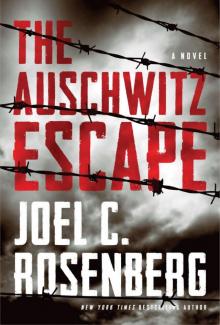 The Auschwitz Escape
The Auschwitz Escape The Last Jihad
The Last Jihad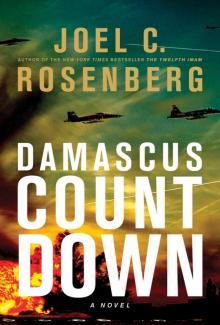 Damascus Countdown
Damascus Countdown The Persian Gamble
The Persian Gamble The Jerusalem Assassin
The Jerusalem Assassin Dead Heat
Dead Heat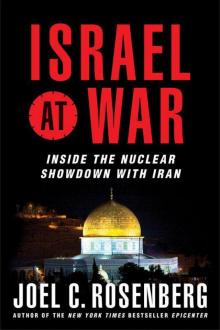 Israel at War: Inside the Nuclear Showdown With Iran
Israel at War: Inside the Nuclear Showdown With Iran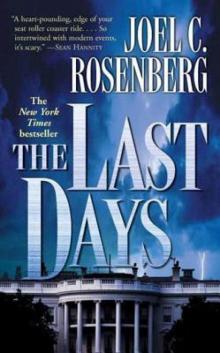 The Last Days
The Last Days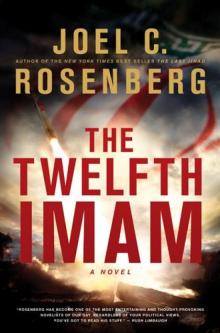 The Twelfth Imam
The Twelfth Imam Epicenter 2.0
Epicenter 2.0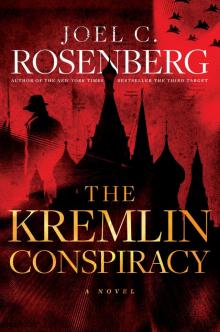 The Kremlin Conspiracy
The Kremlin Conspiracy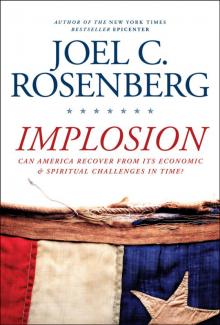 Implosion: Can America Recover From Its Economic and Spiritual Challenges in Time?
Implosion: Can America Recover From Its Economic and Spiritual Challenges in Time? The Third Target: A J. B. Collins Novel
The Third Target: A J. B. Collins Novel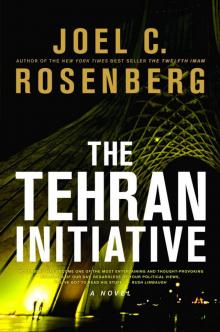 The Tehran Initiative
The Tehran Initiative Inside the Revolution
Inside the Revolution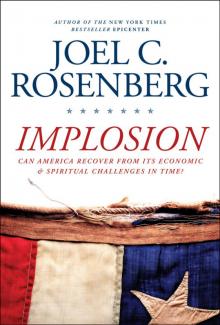 Implosion
Implosion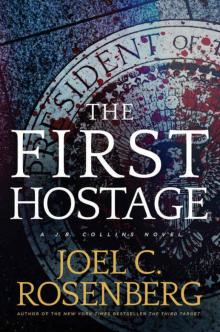 The First Hostage: A J. B. Collins Novel
The First Hostage: A J. B. Collins Novel